How to solve MCQs in IELTS Listening Test | Listening for IELTS PDF Download
IELTS Listening Multiple Choice Questions
IELTS Listening multiple choice questions are one of the most difficult of all the question types, but if you have a good strategy for answering them, you’ll be able to do so successfully.
In multiple choice questions, you are required to choose the correct answer from a list of options.
There are two main types of question:
- Single questions with a choice of 3 answers (A, B or C). Occasionally, there may be 4 options.
- List questions. These have a longer list of possible answers and you must select more than one as specified in the question.
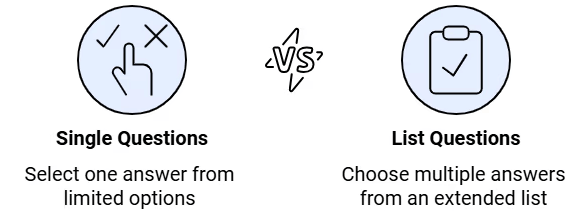
Here are examples of both types of multiple choice questions from a past paper. In this case, they happened to appear together, but this is not common.
Read the instructions very carefully.
IELTS Listening Multiple Choice Questions
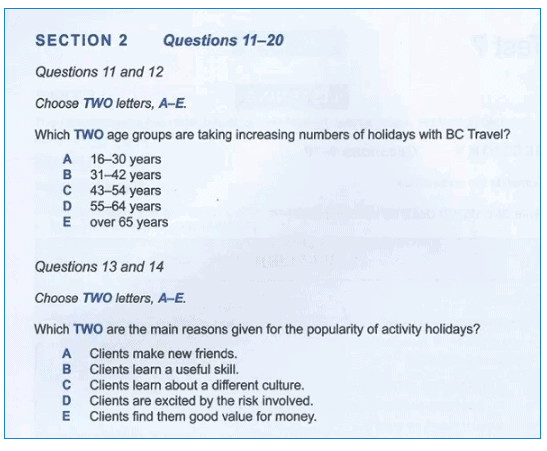
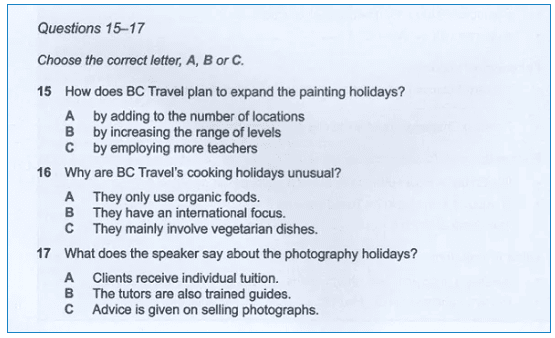
The first set of questions, 11 & 12 and 13 & 14, are list questions. You must choose two answers from answers A – E for each pair of questions.
The second set of questions, 15, 16 and 17, are single questions with three possible answers. You must choose one answer for each from the answers A, B or C.
Now for the strategy for answering multiple choice questions in the IELTS Listening test, including lots of tips and advice on how to overcome the challenges presented by this type of question.
First, here’s the sample question we’ll be working on. It is a simple version of an IELTS Listening multiple choice question and has been created specifically to teach you the strategy.
Sample Multiple Choice Question
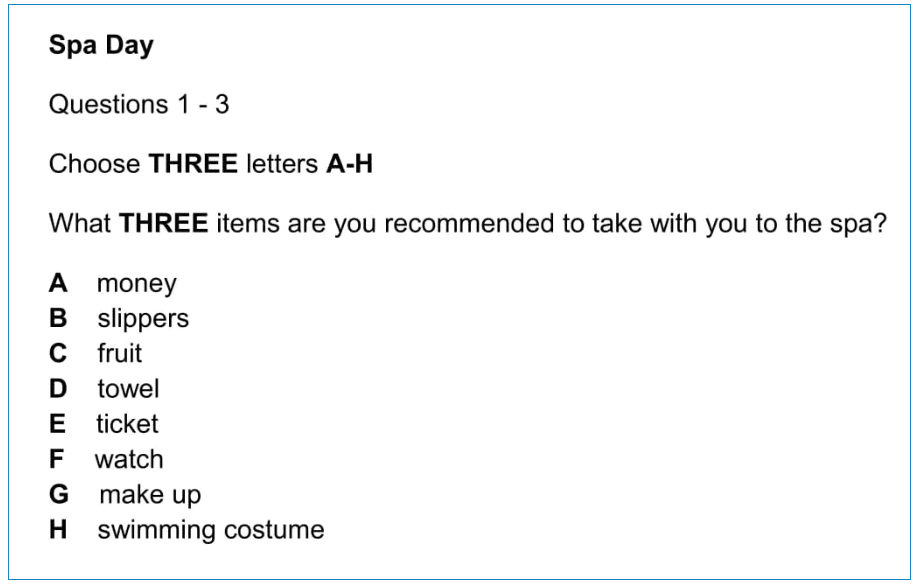
The Strategy
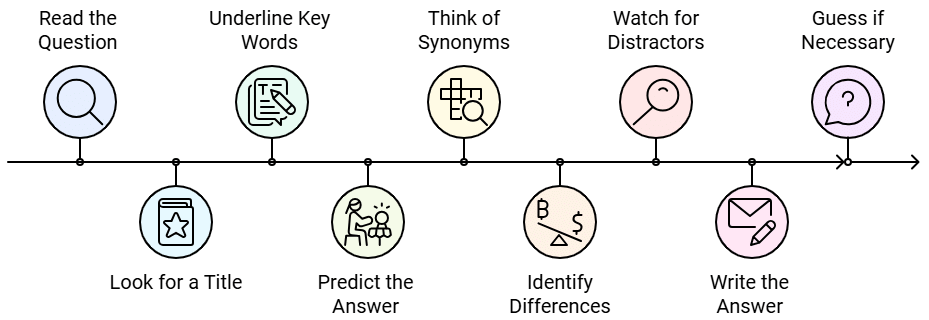
1) Read the question
You will have a short time to prepare before the speaker or speakers begin talking. First, read the question very carefully to ensure that you know exactly what you have to do.
Particularly note the type of question – single with 3 options or list selection with 2 or more answers to identify. For our sample question, we must choose 3 answers. Underline or circle the 3 to remind you.
2) Look for a title
Not every question will have a title, but if there is one, it will tell you the context of the question. This will help you to understand the answers listed and give you a big clue as to what sort of information will be contained in the recording.
Our sample question has the title ‘Spa Day’. Knowing the context gives some collective meaning to the words in the list of possible answers which would otherwise appear random and unrelated.
3) Underline the key word in the question
Next, underline or highlight the key word in the question. In this question, it is ‘recommended’.
What 3 items are you recommended to take with you to the spa?
The question is telling us that we must select 3 items that the speaker will recommend that we take with us on the spa day, that is, things we ‘should’ take.
However, don’t expect the word ‘recommend’ to be used throughout the recording. The speaker isn’t going to say, “I recommend that you take a towel and I recommend that you wear a watch.” Synonyms and paraphrasing will be used extensively, so think of some words that might be used instead, including negatives for things you should not take. For example,
- “You must…”
- “It’s advisable...”
- “You shouldn’t…”
4) Predict the answer
Now look at the list of answers. You may be able to predict which ones are correct or at least one or two of them, and a couple that are probably wrong.
Try this now. Which items do you think you'd be recommended to take to a spa and which are you unlikely to be asked to take with you?
- a) money
- b) slippers
- c) fruit
- d) towel
- e) ticket
- f) watch
- g) make up
- h) swimming costume
5) Think of synonyms
- Expect to hear all the answer options in the recording, not just the correct answers. You will have to listen very carefully to determine if each item is or is not recommended.
- Synonyms will definitely be used for some of the words, so scan the list and see if you can quickly think of any synonyms or related words. An example might be some specific items of fruit for answer (c) instead of the word ‘fruit’.
- So, you are not looking for the exact words but the same meaning.
- Also, be aware that the answers will not be in the same order as you’ll hear them in the recording.
6) Identify the difference
In single questions with a choice of 3 or 4 answers, the answers may be similar in some way to try and catch you out. If this is the case, underline any key words that will help you to work out the difference in meaning between them. An example for our question might be:
- You must take a towel.
- You can borrow a towel.
- A towel will be provided.
7) Watch out for distractors
We already know that all the answers in the list will probably be included in the text, so you need to listen carefully to identify the correct ones. Particularly listen out for distractors as the examiners love to try and trick you into picking the wrong answers.
The way they do this is to give you an answer and then take it away again.
Here are some sentences containing distractors. I’ve highlighted the relevant words.
- I always recommend taking a packed lunch but the spa is providing complimentary refreshments for your visit so you won’t need to.
- The coach will be returning to the hotel at 5.30 p.m. No, sorry, we’ve changed it to 6 o’clock to avoid the worst of the rush hour traffic.
- I don’t usually advise taking any money as everything is included. However, they have a home pamper kit promotion on at the moment so you might like to treat yourself.
So, a distractor is a word or a phrase that changes or corrects the original piece of information given. There will almost certainly be some in the recording, so beware.
The best approach to marking the correct answers is to put a tick beside an answer you think is correct but continue to listen carefully in case you find that it’s wrong after all. If it is, you can quickly change the tick to a cross and eliminate the answer from further consideration.
You can write on your test paper as much as you want to. You’ll have 10 minutes at the end of the Listening test to transfer your answers to the answer sheet.
8) Writing the answer
In IELTS Listening multiple choice questions, your answer will almost always be the letter of the answer, not the words. This will be stated in the instructions, for example:
- Choose THREE letters A-H
So, if one of the correct answers is ‘A money’, you must write ‘A’ not ‘money’. If you do write 'money', your answer will be marked wrong even though the information is correct.
9) Guess if necessary
Never leave a blank space on the answer sheet. If you miss an answer, take an educated guess. This gives you at least some chance of getting it right. Don’t stress about a missed answer or it will affect your ability to answer the next set of questions. Just make your choice and move on.
|
104 videos|39 docs
|
FAQs on How to solve MCQs in IELTS Listening Test - Listening for IELTS
| 1. What strategies can I use to improve my performance in the MCQs of the IELTS Listening test? |  |
| 2. How many multiple-choice questions are there in the IELTS Listening test? |  |
| 3. What should I do if I miss an answer during the listening test? |  |
| 4. Are the answers to the multiple-choice questions in the same order as the audio in the IELTS Listening test? |  |
| 5. Can I use headphones during the IELTS Listening test? |  |





















